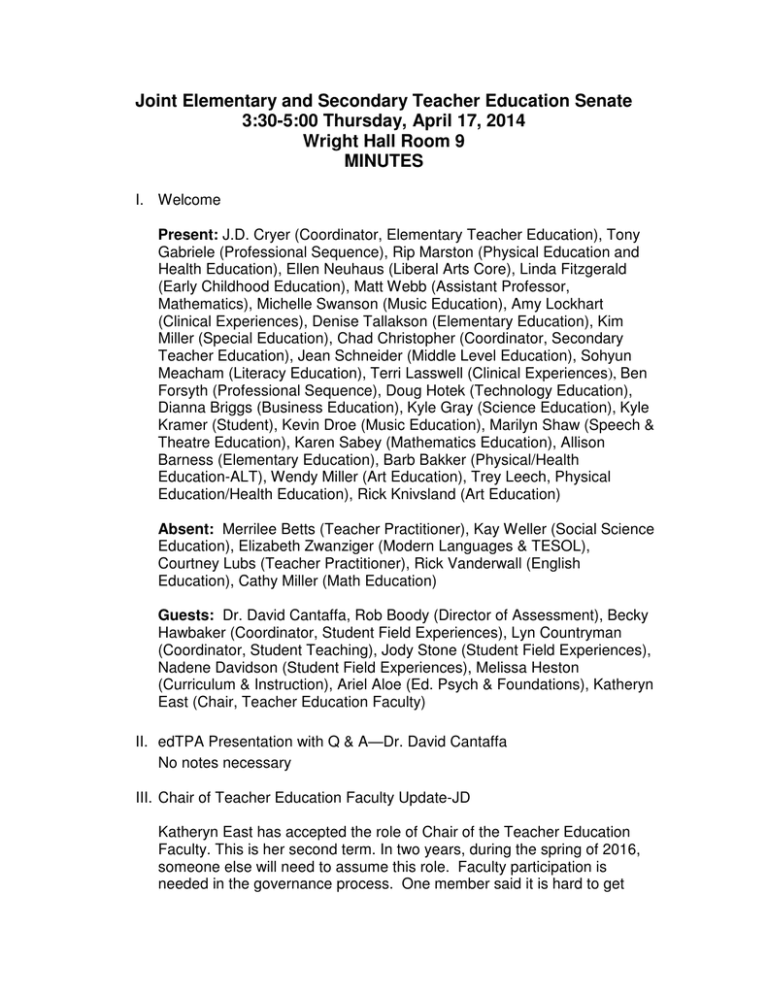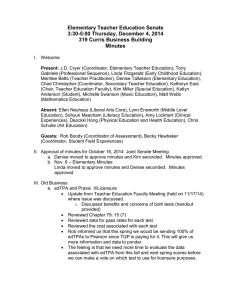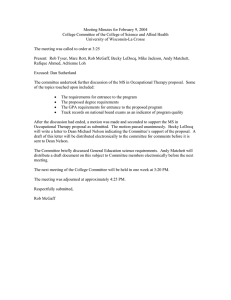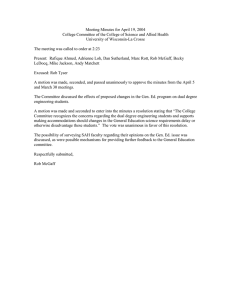Joint Elementary and Secondary Teacher Education Senate Wright Hall Room 9
advertisement

Joint Elementary and Secondary Teacher Education Senate 3:30-5:00 Thursday, April 17, 2014 Wright Hall Room 9 MINUTES I. Welcome Present: J.D. Cryer (Coordinator, Elementary Teacher Education), Tony Gabriele (Professional Sequence), Rip Marston (Physical Education and Health Education), Ellen Neuhaus (Liberal Arts Core), Linda Fitzgerald (Early Childhood Education), Matt Webb (Assistant Professor, Mathematics), Michelle Swanson (Music Education), Amy Lockhart (Clinical Experiences), Denise Tallakson (Elementary Education), Kim Miller (Special Education), Chad Christopher (Coordinator, Secondary Teacher Education), Jean Schneider (Middle Level Education), Sohyun Meacham (Literacy Education), Terri Lasswell (Clinical Experiences), Ben Forsyth (Professional Sequence), Doug Hotek (Technology Education), Dianna Briggs (Business Education), Kyle Gray (Science Education), Kyle Kramer (Student), Kevin Droe (Music Education), Marilyn Shaw (Speech & Theatre Education), Karen Sabey (Mathematics Education), Allison Barness (Elementary Education), Barb Bakker (Physical/Health Education-ALT), Wendy Miller (Art Education), Trey Leech, Physical Education/Health Education), Rick Knivsland (Art Education) Absent: Merrilee Betts (Teacher Practitioner), Kay Weller (Social Science Education), Elizabeth Zwanziger (Modern Languages & TESOL), Courtney Lubs (Teacher Practitioner), Rick Vanderwall (English Education), Cathy Miller (Math Education) Guests: Dr. David Cantaffa, Rob Boody (Director of Assessment), Becky Hawbaker (Coordinator, Student Field Experiences), Lyn Countryman (Coordinator, Student Teaching), Jody Stone (Student Field Experiences), Nadene Davidson (Student Field Experiences), Melissa Heston (Curriculum & Instruction), Ariel Aloe (Ed. Psych & Foundations), Katheryn East (Chair, Teacher Education Faculty) II. edTPA Presentation with Q & A—Dr. David Cantaffa No notes necessary III. Chair of Teacher Education Faculty Update-JD Katheryn East has accepted the role of Chair of the Teacher Education Faculty. This is her second term. In two years, during the spring of 2016, someone else will need to assume this role. Faculty participation is needed in the governance process. One member said it is hard to get people to run and to make it worth their while. She is troubled by the fact that Katheryn was only candidate for this important role. IV. Teacher Education Accountability System—Rob Boody Rob sent everyone a packet of materials that described a possible Teacher Education accountability plan. He then questioned, with regards to the overall approach, why are we calling it a proposed accountability plan? We have an assessment system. Some parts are good. For external review, every 7 years the state accreditation is due. Students need to be recommended for licensure each semester; this plan helps to add a way to improve programs internally. The reason is that although we have assessment we don’t have much accountability. If we have an unfavorable result who is responsible? If everyone is in charge functionally nobody is in charge. The feeling is that we should link accountability to what everyone is already doing in the program. The questions should be, “Are my processes working?” “Is my outcome good and getting better?” If processes aren't linked to the outcome you don't know what to work on. Rob asked another set of questions, “What are the main summative outcomes for TE?” “What do we rely on to recommend for licensure?” GPA, Praxis II, student teaching evaluations, and NOC (our main dispositional assessment is the NOC). Also included would be TWS or edTPA. Those are our main summative outcomes. We should be focusing on a system not specifics. You can throw the specific assessments out but the main idea stays the same. A. Professional Knowledge B. Professional Skills - see handout - this is just suggestions for the senate to think about. C. Professional Dispositions D. Classroom Teaching Skills. The suggestion was to create some teams called Program Improvement Teams (PIT). Elementary and Secondary P-12 should be evaluated for each outcome. There should also be vertical alignment. The teams would be formed by volunteers and then people would be placed on the committee. It would be structured for people with a stake in those areas. See handout. Every two years they would report to the Senates. Someone asked what the recommendations are. Based on approval they could change the process that is vertically aligned with it. Members would be reviewing data. The PIT’s responsibility is to interpret and recommend changes. The Assessment Coordinator would need to make sure the data is collected and sent to the PIT’s to work with data. Someone asked how this already relates to the student assessment reports that are turned in every year. The response is that we are not a program defined; each program has to do SOA's. Another concern is how this would affect those students in Science Ed., Elementary Ed., etc. Basically we are talking about something that effects the entire program. One member questioned having something related to the Professional Sequence. They asked why we would ask faculty to do this when they already work with yearly student assessments and other reports. Rob responded that there would be connected data. We want to encourage conversations to look for patterns in data. It seems that programs blame professional sequence and vice versa, someone mentioned. Someone asked if Rob has the other teams for other PIT’s. Rob said that people who are willing do common assessment should be involved. A member asked if there is a list. Yes, per Rob. This should be negotiated. Becky feels it is valuable to bring people together. This shouldn’t be idiosyncratic. Rob feels that we need cross level discussion. We need connectivity across levels. Chad said this is a big topic and idea and we don’t want it to become more work. The Assessment Coordinator would provide the data and scaffold the data. This should help with problems in the long term. Chad and JD will place this on the summer agenda. V. Field Experience/Student Teaching Rubrics—Becky Hawbaker, Lyn Countryman See handouts. Please note the revamped rubrics are based upon on the new InTASC standards. Becky mentioned the rubrics for student teaching and moving the old standards to new and revising those descriptions. Level I is shown on the yellow handout. With regards to the new InTASC standards, only three categories relate in new InTASC. The mentor teacher and Field Experience Coordinator on campus have input. The gray handout references the newest information for Level III. It was drafted based on what was already there and constraints of weeklong immersive experience. In a week students can't collaborate with parents, which isn’t realistic. Elementary Classroom Management might not be applicable for everyone in Level III. This is the common rubric for Level III. This may not work for everyone because this was written for elementary. In UNITED there is a view with descriptions and a view for numbers. It also listed all 10 of InTASC standards on a 5-point scale. Wording should be developed based on hour constraints. The basic confines of the rubric stay but vary among mentor teachers. We want feedback from colleagues in Ed. Psych regarding co-reqs. and Dynamics of Human Development. One member asked what would happen if we took student teaching rubrics and used for all levels for all student teaching experiences. The numbers could be set to correspond to the level of development we expect at each level. Someone mentioned taking the esoteric information and making it concrete. Another question posed was “How you would recognize a competence?” One member said the rubric is separate from an assessment book. Additional contextual information should be provided on a common scale across the levels of the program as a whole. VI. Future Business A. Senator Updates B. Accreditation Process C. edTPA or Praxis II D. 60 hour requirement VII. Year Long Student Teaching Update—J.D. Cryer VIII. Upcoming dates (subject to change) a. Teacher Education Executive Council - April 18 b. Teacher Education External Advisory Board—Friday, April 25 10:00-3:00 Elementary Senate May 1 Secondary Senate May 8



